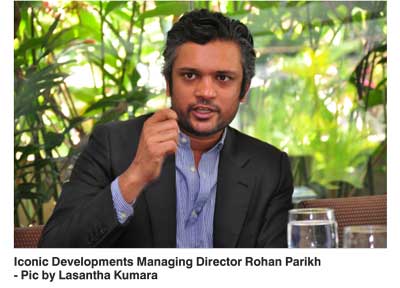Sunday Feb 22, 2026
Sunday Feb 22, 2026
Friday, 18 March 2016 00:00 - - {{hitsCtrl.values.hits}}
India-based property developer and realty major Iconic Developments Ltd, a subsidiary of the Apurva Natvar Parikh Group (ANPG), responsible for the high-end Iconic 110 Parliament Road apartments, is set to begin work on a second luxury residential project in July this year on an investment of $ 50 million. 
The 250-unit apartment building, to be constructed on a two-acre land on Buthgama Road, Rajagiriya, will have up to 30 floors with flats ranging from Rs. 20 to 30 million in price and is scheduled to be completed in three years.
According to Iconic Developments Managing Director Rohan Parikh, the investors of the company’s first project saw a 30 to 40% appreciation from the time they bought their flats.
“It’s going up now. We hope to carry that success forward and do a second project in Colombo. In fact we’re looking at a second, third and fourth project also,” he said.
All its upcoming projects will involve residential development in Colombo in the affordable to luxury range, said Parikh, adding that Iconic is also examining opportunities in Kandy and Galle, though nothing has been finalised yet for those markets.
Rental yield in Sri Lanka approximately in the range of 5% to 6%
Speaking to journalists at an informal luncheon meeting in Colombo yesterday, Parikh s said that while there is definitely an oversupply of condominiums in Sri Lanka, once you consider quality, amenities, etc., there is room for a good product.
“It’s a tough market. Customers here are very specific about quality. There is a market for the right quality for the right price. There are different segments to the market. I think the high end of the market is oversupplied at this point. But there is always potential for real estate at the right price,” he said.
The new project is aimed at Sri Lankan customers, and Iconic has no particular interest in expat or foreign buyers, said Parikh.
“Local Sri Lankans or Sri Lankans living abroad who spend time in Sri Lanka are over 90% of our clientele. The nature of our product, and the way we sell it is more or less geared towards local buyers. We’re not interested in the expat or foreigners buying segment,” he said.
Commenting on Sri Lankan property law with regard to condominiums, Parikh said while it wasn’t as strong in other countries, Sri Lanka’s law ensures that buyers are well protected.
However, the Government is reportedly planning on introducing new legislation with this regard.
“We’ll see the legislation when it comes out,” said Parikh when asked about this.
The foreigners land tax is not a big issue and most countries have restrictions, he said.
“We suggested to the Ministry that you should have an exemption for developers because we’re not cornering land. We’re short term investors. We buy land, we convert it to a building and we give it back to the local residents,” said Parikh.
There should be some exemption; if you’re on a five or 10 year lease you’re exempted from the land tax, he added.
“The idea of the land tax is to prevent foreigners from speculating on Sri Lankan land. Logically the law is sound. There’s no harm in that. Most countries have it. The problem is that it’s affecting developers like us. If foreign developers don’t come in because of land law and apartments become more expensive, the consumer suffers. They need to tweak the law a little bit to allow developers to develop but not corner or exploit land,” explained Parikh.
The weakness of the land law is a lack of pedigree, he said, adding that it’s very difficult to get a land clearance and to understand if the land is free of encumbrance or not. These can be improved and if the registry goes online, it can solve a lot of the problems, he said.
“For example, we have issues where the Urban Development Authority (UDA) and the Sri Lanka Land Reclamation and Development Corporation (SLRDC) they purchase land and put in acquisition certificates from 20 years ago. Those are small things that can be fixed. But in general the system works,” he said.